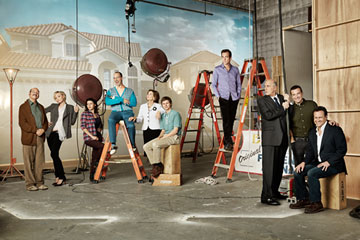
On set with the cast of Arrested Development.
(6 of 6)
This business shift could open up new creative possibilities for writers like Hurwitz, just as when HBO turned over the keys to the likes of David Chase. So many of the things we think of as inherent to TV--commercial breaks, standardized episode lengths, weekly schedules--are simply artifacts of the old delivery system. Online, they're not necessary, and if you can deliver a TV season as a single eight- or 13-hour work, you can literally build a story differently. So Hurwitz is constructing a TV season like a set of linked Web pages, with interconnections and multiple entry points. With House of Cards, director David Fincher avoided the sort of episode-ending cliff hangers that network-TV series use to bring viewers back a week later. He knew fans could simply press PLAY on another episode. (Soon enough, those same fans might also be pressing BUY--a generation has learned to buy books and camping gear from Amazon, so why not TV?)
Amazon, Netflix and their rivals are betting on a future in which the network is, if not dead, less essential. Should you bet against them? Go ask your local bookstore or video-rental joint, if you can find one.
Netflix's TV still looks like TV, though, especially when it's being made. Late on an October night, the crew has decked out a parking lot as the midway of a Mexican-themed carnival for a scene that will appear in several episodes. There are rides and rows of tents strung with flags and colored lights. The stair car is parked nearby; Martin Mull--who guests as private investigator Gene Parmesan--is decked out in a sombrero and poncho. In the scene, an emotionally distraught Buster (Hale) staggers up to a juice stand advertising "Donkey Punch." Sputters Hale: "I want to punch the donkey!"
The line reading is pure Buster; you'd think it was seven weeks since the show went off the air, not seven years. That's the funny thing here--the new Arrested Development is a revolutionary media event, but it's also an old-fashioned TV show. On Fox, the series had to bleep profanities (often to hilarious effect, as in an episode that alternated the feline and filthy usages of pussy). On Netflix, it could swear at will, but it's still going to bleep. "I think it's because I have young daughters," Hurwitz tells me. "It's also funnier. A lot of comedy is about letting the audience finish the thought in their brains."
And even though Hurwitz built the new Arrested Development to be intertextual, self-referential and friendly to rewatching, he does have a suggestion. A plea, even. "Don't feel compelled to watch it all at once," he says. "It's wonderful and flattering that anyone would want to--I don't take any of that for granted. But comedy requires something of the human body. I hope people are laughing, but you can get tired of laughing. So really, it's O.K. with us if you take your time. That's the whole thing with Netflix. Do with it what you want. It's yours now."
So it is--for a $7.99 monthly subscription fee. Seven years ago, network TV couldn't figure out a way to keep the Bluths in business. It would be a fitting, ironic legacy if the Bluths were to show the TV industry, once and for all, that there's money in the banana stand.
